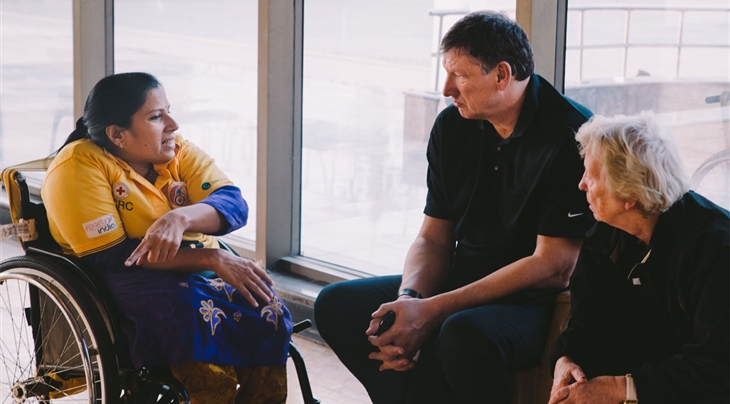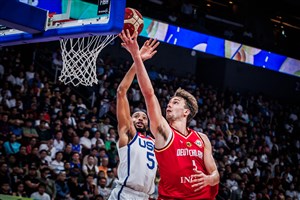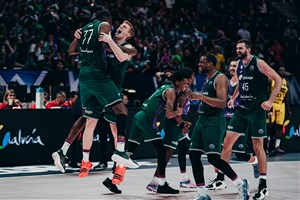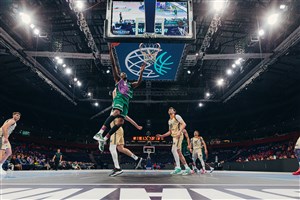
Before the best of the world, the rest of the world
CHARLOTTE (Steve Goldberg's Wheel World) - With the Rio Paralympic Games getting closer every day - and the NBA season finally closed - so much of our attention is narrowly focused to the elite teams that will hit the hardcourts in Brazil come September. And while I'm right there in the middle of all that, I remind myself not to lose aspect on the broader game.
So before I get back to talking about those competing for medals, I'm thinking about India and how the interest in and organization of wheelchair basketball has expanded in the world's second largest population since I first wrote about it almost about a year and a half ago.
The International Wheelchair Basketball Federation (IWBF) is more than thinking about India. They are there in force as I write this, as instructors for the first-ever presentation of the IWBF's new "Introduction to Wheelchair Basketball for Developing NOWBS" initiative. (Or, as I'm calling it, Wheelchair ball for Newbies. Though not explicitly stated, I'm guessing that acronym would stand for National Organizations of Wheelchair Basketball.)

Support from the IWBF was evident at the 2nd National Wheelchair Basketball Championship of India in December 2015. (L-R) IWBF Asia Oceania Zone Classification Officer Toufic Allouche (Lebanon) and AOZ West Region Vice president Anisa Ibrahim Abbas Al Hooti, WBFI President Madhavi Latha, IWBF President Ulf Mehrens (Germany), IWBF AOZ President Saad Alazmaa (Kuwait), WBFI Secretary-General Kalyani Rajaraman, , and IWBF Secretary-General Maureen Orchard (Canada). Photo courtesy of Shrikkanth Govindarajan/TheBetterIndia.com
It's a national-level wheelchair basketball technical camp locally organized by the Wheelchair Basketball Federation of India (WBFI) in collaboration with Sports Authority of Telangana State (SATS), the International Committee of the Red Cross (ICRC) and Cognizant, as well as support from the AGITOS Foundation to develop the key facets of the game: players, coaches, referees, administrators and classifiers.
#Hyderabad hosts #India's 1st int'l #wheelchair #basketball exhibition match w/ #Thailand this week! #StayTuned pic.twitter.com/vYFymrU61S
— ICRC New Delhi (@ICRC_nd) June 20, 2016
To bolster the competition side, a team from Thailand has come in for exhibition games against an Indian selection.
The IWBF delegation includes: Secretary-General Maureen Orchard of Canada; Technical Commission chairman Norbert Kucera from Germany; and the Classification Officers of the IWBF's Asia Oceania and IWBF Europe zones, Toufic Allouche of Lebanon and Maurice Hammerton from United Kingdom.
The NBA certainly recognizes that India is an emerging market for basketball. I had the chance to ask league commissioner Adam Silver about that when he was visiting Charlotte for a Hornets game in December 2014.
"They have an incredibly young population," he told me. "It’s a population of well over a billion people and 50 percent of that population is under 25. We know if young people play basketball, they are 20 times more likely to be a fan when they grow up. They gain an understanding and appreciation of the game."
That's why Silver has been an advocate for having NBA players and coaches participate in Basketball without Borders (BWB) and other camps as well as playing in and promoting the high-profile FIBA Basketball World Cup and Olympic tournaments. He knows those connections can only bring more people to the game.
The IWBF understands as well that it's like the old New York Lottery tagline: you have to be in it to win it.
Not specifically speaking to it but nonetheless pertinent to the wheelchair game in India, Silver added: "The government as well as the private sector is very focused on kids being healthy so especially in cities with such a dense population, basketball is one of those sports that young people can participate in."
That's the point for which Madhavi Latha has become an evangelist, that sport can change lives for the better, and specifically for those with a disability.
Playing basketball has made me more positive. I don't see my condition as a disadvantage; rather I feel I have more opportunities now. - W Arul Augustus, 21, a civil engineering student and candidate for India's Men's U-23 team
Latha founded the WBFI in 2014 and in that same year, convinced the IWBF to grant provisional membership with full membership on the horizon at the next IWBF Congress in 2018. They will attempt to qualify for the 2017 IWBF Men's U-23 World Championship in Canada.
An administrator by necessity, Latha is a player by choice and is on India's first women's team.
She is one tough cookie and has the trophy from the Adding Smiles Ambassador Awards - the Built Tough Award, (which inadvertently likens her to a certain American pickup truck) to prove it, though that's far from necessary for anyone who knows her.
Eight years ago, diagnosed with polio, she was given a year to live. After surgery to alleviate the damage a compressed spine did to her lungs, she undertook hydrotherapy to exercise weakened muscles though many close to her advised against it. That led to swimming, first in 2010 at an able-bodied corporate "Olympiad" for the company where she worked and then in the India Para-swimming National Championships where she won three gold medals at age 40.
If it worked for her, then what kind of impact could it have for others, especially children, she wondered. Latha began a movement called "Yes We Too Can", to reach and educate people with disabilities about the benefits that sports could have in their lives. She quickly realized that the broader society needed some educating on the truths of disability as well.
More than the president of the WBFI, Madhavi Latha is a player. Photo courtesy of Shrikkanth Govindarajan/TheBetterIndia.com
In 2011, Latha coordinated a group that led to the formation of the state-level Paralympic Swimming Association of Tamil Nadu that started with four para-swimmers and now numbers around 300, 60 of whom qualified and represented the state in the recent national championship.
Three years later, she turned her focus to basketball and with the help of others and the International Red Cross, started the WBFI.
In just two years, the federation has taken wheelchair basketball to 9 of India's 29 states and from the 20 or so players that attended her first camp, there are over 350 now playing the game.
But she's just getting started. The UK-based Choice International estimates there are over 28 million people with a disability in this country of 1.3 billion. Yet India's delegation to the London 2012 Paralympics included just 10 athletes.
You can read more about Madhavi Latha in an article linked here written by Shrikkanth Govindarajan, a documentary photographer and filmmaker from Chennai where the WBFI is based.
It cannot just be coincidental that there are significant changes in the making across India as the definition of disability is being reassessed; a more accurate census of that population is being prioritized; and an Accessible India campaign has been launched "to make buildings and public utilities more disabled-friendly."
While Latha and the WBFI may not be leading scorer on that, they certainly merit credit for the assist.
And while they won't be in Rio, that's as good as gold.
Steve Goldberg
FIBA
FIBA's columnists write on a wide range of topics relating to basketball that are of interest to them. The opinions they express are their own and in no way reflect those of FIBA.
FIBA takes no responsibility and gives no guarantees, warranties or representations, implied or otherwise, for the content or accuracy of the content and opinion expressed in the above article.
To help make this column as inclusive as possible, please send any national or international event information, story suggestions, or comments to wheelworldmail@gmail.com.

















